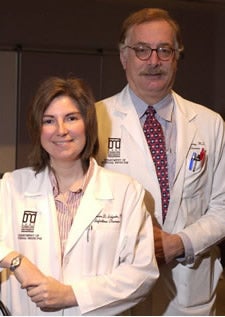Kerkering and Salgado take on infection, disease
GREENVILE, NC (Feb. 6, 2004) — One of the worst flu seasons in recent memory, a worldwide SARS scare, fears of mosquitoes and West Nile Virus, and the country’s first confirmed case of mad cow disease are just some of the disease puzzles that faced Drs. Cassandra Salgado and Thomas Kerkering during their first few months of working together as the lead infection physicians at Pitt County Memorial Hospital and the Brody School of Medicine at East Carolina University.
As if those diseases weren’t enough to keep them busy, the pair also worked to reduce the incidence of hospital-acquired infections, urging doctors and hospital staffers to wash their hands and speaking with the public about the realities of antibiotic-resistant Staphylococcus aureus and other tough bugs.

Drs. Cassandra Salgado and Thomas Kerkering lead efforts to control infections and infectious diseases at PCMH. Photo by Cliff Hollis.
Kerkering is a professor of medicine and microbiology, heads the infectious disease division of the school’s Department of Internal Medicine and chairs PCMH’s infection control committee. Salgado is an assistant professor at the medical school, the PCMH epidemiologist and medical director of the hospital’s infection control program.
“It’s fun. It’s just always something that’s been fascinating to me,” Kerkering said of his decision to specialize in infectious diseases. “You’re looking at two biological systems. You’re looking at the human side, but you’re also looking at the germ side.”
To reduce the number and severity of hospital-acquired infections at PCMH, Kerkering and Salgado take a two-pronged approach: keeping things clean so infections don’t start and properly managing antibiotics (Dr. Paul Cook, ECU associate professor of medicine, leads the effort to manage antibiotic use.) once they do start so that the bacteria don’t build resistance. According to the Centers for Disease Control and Prevention, approximately 100,000 people died of a hospital-acquired infection in 2002. Also, the CDC says, 28 percent of the bacteria that most frequently cause hospital-acquired infections in the United States are resistant to the preferred antibiotic for treatment. Many other pathogens, including the agents that cause malaria, tuberculosis, gonorrhea, HIV/AIDS and salmonellosis, are becoming resistant to standard therapy.
Taking on these challenges is where Kerkering and Salgado’s expertise is paying off, according to Jim Riggs, administrator of safety and infection control at the hospital. PCMH’s infection control program got a strong start under the leadership of Dr. Jeff Engel, who left in July 2002 to become the state epidemiologist, and Kerkering and Salgado have built on that foundation, Riggs said.
“They just bring a lot of expertise and enthusiasm to their roles,” Riggs said. “I think you’ll see this medical center become more recognized, even more than it is now, for cutting-edge infection-control activities.”
Salgado, 36, arrived in Greenville in July from the University of Virginia in Charlottesville, where she recently completed fellowship training in infectious diseases. There, she studied with Dr. Barry Farr, a national leader in infection control and infectious diseases.
Salgado was born in California but grew up in West Virginia. She has a bachelor’s degree in chemistry from West Virginia University in Morgantown, a medical degree from WVU School of Medicine and a master’s degree in health evaluation sciences and epidemiology from the University of Virginia. Board-certified in internal medicine, pediatrics and infectious diseases, Salgado specializes in general infectious diseases, comprehensive HIV care, hospital epidemiology, and infection control.
“I can’t ever remember wanting to do anything else,” Salgado said of being a doctor. She credited medical school professors who were infectious disease specialists with spurring her into the specialty, which she describes as complex and “like putting together pieces of a puzzle.”